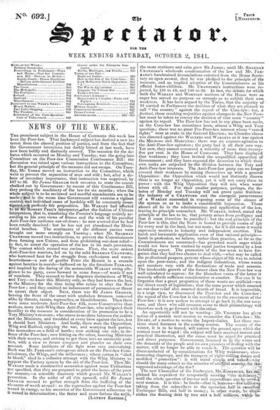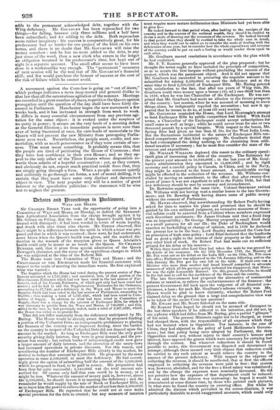NEWS OF THE WEEK.
the more stubborn and calm grew Sir JAMES ; until Mr. SHARMAN CRAWFORD'S wholesale condemnation of the law and Mr. FEEr stasty's harebrained denunciations extorted from the Home Secre- tary an open avowal, that he was pledged to the principle of the measure, and an implied adoption of the Commissioners as. his ' official foster-children. Mr. CRAWFORD'S instru'etions were re- jected, by 131 to 49, and 146 to 32. In fact, the debite for which both the WAKLEY and WORTLEY sections of the House were so eager has served no purpose so strongly as to exhibit their own weakness. It has been argued by the Tories, that the majority of 91 carried to Parliament the decision of what they are pleased to call "the country" against the repeal of 'the Corn-law : but, a fortiori, these crushing majorities against changes in the New Poor- law must be taken to convey the decision of- that same "country" against its repeal. The Poor-law has not in any place been made, as the Corn-law has sometimes been, almost a Whig and Tory question ; there was-no great Pro-Poor-law interest whose "vested rights " were at stake in the Geheral Election ; no Chandos clause was directed against the WALTMLS and WARLEYS as it was against -the MILTONS and .Moitrsuss : there was no counter-agitation to the Anti-Poor-law agitation ; the party had it all their own way. Yet now, they cannot command a minority of more thin twenty- five per cent. in -the House of Commons. They have displayed that weakness; they have invited the. unqualified _opposition of Government ; and they have exposed-the desertion to which their own ranks are subjected -by.tbe:---diViSion between the Tory and Anti-Poor-law interests. The Anti-Poor-law party can no longer conceal their weakness by mixing themselves up with a general Opposition: the Opposition which would not distinctly disown them is no longer an Opposition, yet it will not carry them to power : with the Whig Opposition they will mix when water mixes with oil. For their smaller purposes, perhaps, the de- bates of Monday and Tuesday will not prove quite fruitless: the industry of a Caswroan and the energetic perseverance of a WAELEY succeeded in exposing some of the abuses of the system so as to make a considerable impression. Those abuses all lie in the administration and application of the law, leaving its principle untouched. Mr. WAHLEY, indeed, stated the principle of the law to be, that poverty arises from profligacy and that it must therefore be punished : but the real principle of the Poor-law is this, that the State is bound to provide means of life for every soul in the land, but not more ; for if it did more it would supersede motives to industry and independent exertion. The harsh and inexorable application even of that rational principle— harsh in profession, we believe, rather than practice, so far as the Commissioners are concerned—has provoked much anger which would not have been excited by equal justice tempered by a less forbidding aspect. The promoters of the law seem to have for- gotten that they had two classes to deal with,—what may be called the professional paupers, persons whose object of life was to subsist upon the poor-rates ; and the indigent industrious, whose wants and numbers vary with the fluctuations of trade and seasons. The intolerable growth of the former class the New Poor-law was well calculated to repress : for the blameless wants of the latter it scarcely affords sufficient consideration or comfort. Nor can it be forgotten that a great proportion of those wants are artificial—are the direct result of legislation ; that the same power which enacted no out-door relief also enacted dearth of bread. It is impossible, in a large view, to disconnect the Poor-law and the Corn-law: the repeal otthe Corn-law is the corollary to the enactment of the Poor-law : it is now useless to attempt to go back in the one mea- sure, and those who add common sense to their philanthropy will therefore seek to go forward with the other. An opportunity will not be wanting : Mr. VILLIERS has given notice of a motion next session to reconsider the Corn-law ; Mr. EWART, of a motion to revise the Import-duties. Let those mo- tions stand foremost in the coming session. The events of the winter, it is to be feared, will narrow the ground upon which the contest must be waged : the subject will have received instant and practical illustration, and the cause must be urged for practical and direct purposes. Government, hemmed in by the wants and the demands of the people and its own promises of dealing with the matter, will no longer be able to evade it. The question will be disencumbered of by-considerations for Whig weaknesses, elec- tioneering claptraps, and the trumpery of eight-shilliog-dtaits and modified "protection": it will stand simple, on* -naskeiwhy_ should the many submit to the miseries of artMittl searck,•fot tbe: supposed advantage of the few?
sot
The new Chancellor of the Exchequer, MrOCLBURN, ha's' --
plained his expedient for temporarily meetittg "the deficietic- until the whole question of income and expenditure can be r next session. It is this : he funds—that is, brots—fivilWicmot taking from the subscribers to the operation, half in caneellfe Exchequer Bills, and half in money ; in ogler vfords, he 41. nishes the floating debt by two and a half millions, adds to the permanent acknowledged debt, together with the Whig deficiency. Mr. GOULBURN has been reproached for two things,—for failing, because only three millions and a half have been subscribed ; and for adding to the debt. Both reproaches seem rather imaginary : his success is comparatively great, for his predecessor bad no tender for one project of the kind on his own terms, and there is no doubt that Mr. Got:macaw will raise the money somehow : and he has no more added to the debt, in any just sense of the word, than a new clerk who enters in the ledger an obligation incurred in his predecessor's time, but kept out of sight in a separate account. The small affair seems to have been done in a workmanlike way enough. The "permanent" measures of next session will be the real test of Mr. GOULBURN'S financial skill; and few would purchase the honour of success at the cost of the risk of failure which he cannot avoid.



























